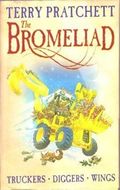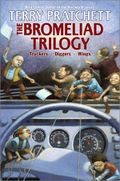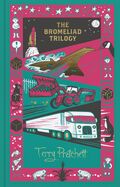Bromeliad: Difference between revisions
(Broadened explanation of Bromeliads a bit, since the grouping includes (for example) pineapples) |
No edit summary |
||
| Line 3: | Line 3: | ||
|cover=[[File:Bromeliad Cover.jpg|thumb|240px|Cover Second Edition by David Wyatt (2008)]] | |cover=[[File:Bromeliad Cover.jpg|thumb|240px|Cover Second Edition by David Wyatt (2008)]] | ||
|coauthors= | |coauthors= | ||
|illustrator= | |||
|date=November 1998 | |date=November 1998 | ||
|publisher=Doubleday | |publisher=Doubleday | ||
| Line 13: | Line 14: | ||
|notes= | |notes= | ||
}} | }} | ||
'''The Bromeliad''' is the name of the [[Collections|trilogy]] about the nomes. {{T}} was the first book, {{D}} was the second, and {{WI}} was the third. | '''The Bromeliad''' or '''The Bromeliad Trilogy''' is the name of the [[Collections|trilogy]] about the [[nomes]]. {{T}} was the first book, {{D}} was the second, and {{WI}} was the third. | ||
It's taken from the name for a family of plants on [[Roundworld]], and more specifically the species that grow in the airy and well-lit upper branches of trees in the rainforest, principally in South America. This possibly parasitic plant puts out very big, long-lasting flowers that act as natural reservoirs for rainwater. A well-established [[wikipedia:Bromeliad|bromeliad]] will end up sustaining its own more-or-less self-contained ecology, including small yellow frogs which live their entire life cycles in the water within the flower. These are used in {{D}} as a metaphor for the lives of [[Nomes]], especially for those who lived as a self-contained and possibly parasitic ecology within the walls and floors of the [[Store]]. However, it becomes apparent that a wider metaphor also applies here for ''all'' Nomes, who are effectively living as parasites on the margins of human society, in a world not their own, and where the slightest knock, or circumstances beyond their control altering, means they have to adapt or die. And, it could be wider, if we think that the [[Roundworld]] is too big for us, little humans... | It's taken from the name for a family of plants on [[Roundworld]], and more specifically the species that grow in the airy and well-lit upper branches of trees in the rainforest, principally in South America. This possibly parasitic plant puts out very big, long-lasting flowers that act as natural reservoirs for rainwater. A well-established [[wikipedia:Bromeliad|bromeliad]] will end up sustaining its own more-or-less self-contained ecology, including small yellow frogs which live their entire life cycles in the water within the flower. These are used in {{D}} as a metaphor for the lives of [[Nomes]], especially for those who lived as a self-contained and possibly parasitic ecology within the walls and floors of the [[Store]]. However, it becomes apparent that a wider metaphor also applies here for ''all'' Nomes, who are effectively living as parasites on the margins of human society, in a world not their own, and where the slightest knock, or circumstances beyond their control altering, means they have to adapt or die. And, it could be wider, if we think that the [[Roundworld]] is too big for us, little humans... | ||
| Line 26: | Line 27: | ||
| valign="top" | [[File:Brom Proof.jpg|thumb|140px|Book Proof-US]] | | valign="top" | [[File:Brom Proof.jpg|thumb|140px|Book Proof-US]] | ||
| valign="top" | [[File:Brom SG.jpg|thumb|120px|Cover by S. Saelig Gallagher]] | | valign="top" | [[File:Brom SG.jpg|thumb|120px|Cover by S. Saelig Gallagher]] | ||
| valign="top" | [[File:Brom SG2.jpg|thumb|120px| Cover by S. Saelig Gallagher-Library Binding]] | | valign="top" | [[File:Brom SG2.jpg|thumb|120px|Cover by S. Saelig Gallagher-Library Binding]] | ||
| valign="top" | [[File:Brom CL.jpg|thumb|120px|Collectors Library Edition by Joe McLaren]] | |||
|} | |} | ||
[[Category:Bromeliad series|Bromeliad]] | [[Category:Bromeliad series|Bromeliad]] | ||
Latest revision as of 15:53, 8 August 2023
| The Bromeliad | |
 | |
| Co-author(s) | |
| Illustrator(s) | |
| Publisher | Doubleday |
| Publication date | November 1998 |
| ISBN | 0385410441 |
| Pages | 512 |
| RRP | £9.99 |
| Main characters | Masklin, Grimma, Gurder |
| Series | Bromeliad |
| Annotations | View |
| Notes | |
| All data relates to the first UK edition. | |
The Bromeliad or The Bromeliad Trilogy is the name of the trilogy about the nomes. Truckers was the first book, Diggers was the second, and Wings was the third.
It's taken from the name for a family of plants on Roundworld, and more specifically the species that grow in the airy and well-lit upper branches of trees in the rainforest, principally in South America. This possibly parasitic plant puts out very big, long-lasting flowers that act as natural reservoirs for rainwater. A well-established bromeliad will end up sustaining its own more-or-less self-contained ecology, including small yellow frogs which live their entire life cycles in the water within the flower. These are used in Diggers as a metaphor for the lives of Nomes, especially for those who lived as a self-contained and possibly parasitic ecology within the walls and floors of the Store. However, it becomes apparent that a wider metaphor also applies here for all Nomes, who are effectively living as parasites on the margins of human society, in a world not their own, and where the slightest knock, or circumstances beyond their control altering, means they have to adapt or die. And, it could be wider, if we think that the Roundworld is too big for us, little humans...
Masklin, once in a sort of control of the Starship Swan, brings back a bromeliad flower, plus frogs, as a sort of ad-hoc Interflora gift for a very special person...
Gallery
 |
 |
 |
 |
 |
 |